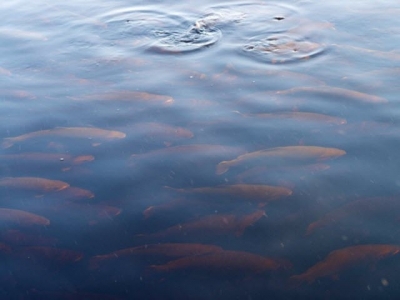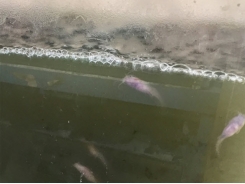Yeast, plant extracts may support farmed salmon in stress

Adding yeast or plant extracts to salmon feed may improve fish responses during stressful periods, say researchers.
An international team of researchers from Chile and Spain examined the use of yeast and plant extracts in the diets of farmed and stressed Atlantic salmon.
“The aim of this study was to evaluate the effect of yeast extract (Xanthophyllomyces dendrorhous) and the combination of plant extracts with previously reported antioxidant properties (common Saint John's wort, lemon balm, and rosemary) on the antioxidant and immune status of Atlantic salmon grown on normal cultured conditions and then subjected to crowding stress in order to evaluate their utilization as functional feed supplements,” the researchers said.
The research team found that use of the feed additives in salmon diets improved antioxidant response for several immune markers when fish were subjected to crowding stress.
“Atlantic salmon fed with functional diets based on yeast (Xanthophyllomyces dendrorhous) and plant (Saint John's wort, lemon balm, and rosemary) extract improve the antioxidant status and increase the expression of genes related to Th2-like response suggesting a protective role preventing cell damage in fish subjected to crowding stress,” they said.
1/ Why yeast and extracts?
Aquaculture continues to expand and the production of Atlantic salmon also has increased in recent years, the researchers said. The continuing growth of the salmon industry however had led fish to be exposed to negative stimuli that can cause stress.
Stress has been linked to negative results for fish welfare and performance including higher susceptibility to disease and a reduced immune response, they said. However, fish nutrition is considered a pathway to improve fish health.
As feeds also can be the most expensive part of production, they should be integrated into health management strategies for production, they said. One option is to use functional feeds, and interest in feed design is increasing.
“A functional feed is a diet which contains components that provide specific benefits to the host beyond the basic nutritional requirement,” said the authors. "These diets may improve fish health and welfare.”
Functional feeds may include ingredients like pre and probiotics, minerals, plant or algae extracts, yeast and vitamins, they added.
However, many of the studies done on functional feeds look at growth, stress and immune response, often in regards to pathogen exposure, they said. Less work has been done looking at use of a functional feed and the response to stressors.
Salmon has not been one of the fish evaluated for crowding stress while receiving a functional feed.
Yeast was of interest because it is considered an immuno-stimulate, and other compounds have been linked to the reduction of oxidative stress and lipid peroxides levels, said the researchers. St. John’s wort is considered to provide several properties including hypericin, tannins and flavonoids, which may be linked to antioxidant activity.
Similarly, lemon balm is known to provide sedative, antispasmodic, antibacterial, antiviral, anti-inflammatory, neuro-protective and carminative elements, they said. Lamiaceae, or rosemary, also is considered to have antibacterial, antifungal and anti-inflammatory properties.
“The utilization of common Saint John's wort (Hypericum perforatum), lemon balm (Melissa officinalis), and rosemary (Melissa officinalis) opens the possibility to develop a functional feed for fish which may provide specific benefits both for antioxidant and immunological activity,” they said.
2/ Methods and materials
In the feeding trial, 420 fish were given one of three diets for a period of 30 days in normal production conditions, the researchers said. The fish were then subjected to crowding stress for a 10-day period.
The diets, A, B and a control, included fish and feather meal-based proteins sources and fish oil, they said. “Contents of total protein, ethereal extract and ash were 55%, 18% and 12%, respectively,” they added.
In addition to the control feed, diet A also included 0.5g kg-1 of yeast extract and 1g kg-1 of vitamin C, while diet B added 6g kg-1 of plant extract to the control diet, they said. Diets were then pelleted and ground.
Fish samples were collected on days 20, 30 and at the end of the trial to check for antioxidants and immune status, they said. Gut, muscle and spleen were harvested.
3/ Results
There was a link found between the use of the feed additives and expression of immune markers, the researchers said.
On day 30 lipid peroxidation had decreased for fish on diet A compared to the control, they said. And both groups of fish getting trial diets had reduced peroxidation after the stress event.
“Altogether, these functional diets improved the antioxidant status and increased the expression of genes related to Th2-like response suggesting a protective role on fish subjected to crowding stress,” they said.
Looking at oxidative stress, protein carbonylation levels were checked on days 20, 30 and 40, they said. After 20 days, there was an increase in protein damage for fish getting the yeast-supplemented diet while the other two diets were the comparable to each other, but by day 30 fish on both functional feeds had a reduction in protein carbonylation.
That drop was more distinct on day 40, when lowered 94% for diet A and 95% for diet B, while the control diet results did not alter, said the researchers. “Taking together these results indicate that functional diets based on yeast (Xanthophyllomyces dendrorhous) and the mixing of plant extract (common Saint John's wort, lemon balm, and rosemary) with previously reported antioxidant properties, produced a lower long-term oxidative damage effect in Atlantic salmon,” they added.
The expression on several immune markers, including IFy, CD4, IL-10, IgMmb, IgMsec, T-Bt and GATA-3, altered when fish experienced crowding, they said.
“The results indicate that a controlled pro-inflammatory response could take place in fish fed with functional feed under normal cultured conditions,” they said. “The feeding with functional diets during 30 days could help to promote the expression of immune markers associated to humoral-like response (CD4, IL-10, GATA-3) when fish were subjected to crowding stress.”
Source: Fish & Shellfish Immunology
Authors: S. Reyes-Cerpa, E. Vallejos-Vidal, M. Gonzalez-Bown, J. Morales-Reyes, D. Pérez-Stuardo, D. Vargas, M. Imarai, V. Cifuentes, E. Spencer, A. Sandino, F. Reyes-López
Related news
Tools

Phối trộn thức ăn chăn nuôi

Pha dung dịch thủy canh

Định mức cho tôm ăn

Phối trộn phân bón NPK

Xác định tỷ lệ tôm sống

Chuyển đổi đơn vị phân bón

Xác định công suất sục khí

Chuyển đổi đơn vị tôm

Tính diện tích nhà kính

Tính thể tích ao



 What does the salmon net pen of the…
What does the salmon net pen of the…  Does a spoonful of fish feed help the…
Does a spoonful of fish feed help the…